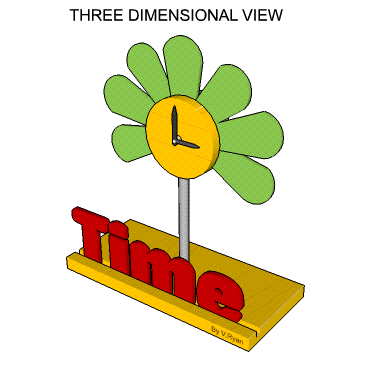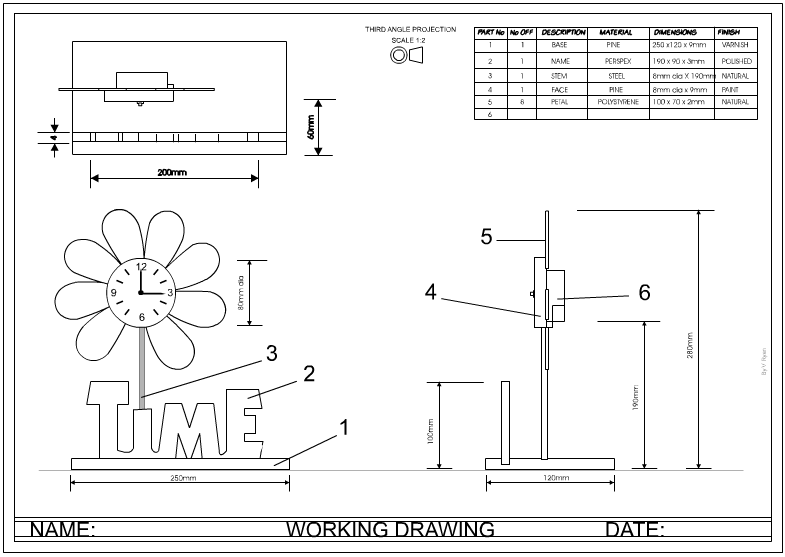| CLICK HERE FOR INDEX PAGE | |
| THE DESIGNER AND ORTHOGRAPHIC DRAWING | |
| V. Ryan © 2010 | |
|
An orthographic drawing, sometimes called a working drawing, is usually
the last drawing produced by a designer. It normally has three accurate
views of a product, a front view, side view and plan view. Dimensions
(measurements) are also drawn on each view, ensuring the manufacturer can
make the product to the precise size and the designers requirements. A
parts list is also included. This has the precise measurements for every
part of the product and includes details such as materials and finish. A working drawing is required if manufacturing is to take place |
|
 |
The working drawing seen below is for a clock. It has been drawn in a
system called Third Angle Orthographic Projection, a world standard for
this type of presentation. It should be possible for a designer based in the UK, to draw an working drawing of a product and for it to be manufactured in another country, by using only the orthographic drawing. This is called ‘Remote Manufacture’. The orthographic drawing should be accurate and include all the information required for manufacturing. Designers often use this process for the design and manufacture of products. |
| THIRD ANGLE ORTHOGRAPHIC DRAWING - ANIMATION | |
 |
|
| ORTHOGRAPHIC DRAWING - HOW IT IS PRESENTED TO A MANUFACTURER | |
 |
|
| Designers often use remote manufacturing, in an attempt to keep costs low. Designers also produce working drawings so that prototypes can be manufactured, and then tested. This leads to improvements being made to the product. Working drawings are usually produced using CAD, although skilled designers still draw them be hand, at least in the early stage of the designing process. Designers find sketching in orthographic projection very useful. | |
|
Information found on a working drawing / orthographic drawing: All necessary views required for manufacturing. All the necessary measurements (called dimensions). A standard format for working drawings. A parts list which includes all the information needed to make each part of the product. |
|
| CLICK BELOW FOR FURTHER INFORMATION ON ORTHOGRAPHIC DRAWING | |
|
ORTHOGRAPHIC PROJECTION
1. Introduction to Third Angle Orthographic Drawing 2. Third Angle Orthographic Drawing - an Example 3. Third Angle Orthographic Projection - Further Explanation 4. Wind Power Device - Orthographic Drawing 5. First Angle Orthographic Projection 8. Orthographic Drawing - Mobile Phone Example 9. Stages of Drawing a Mobile Phone in Orthographic |
|
| CLICK HERE FOR PRODUCT DESIGN INDEX PAGE | |